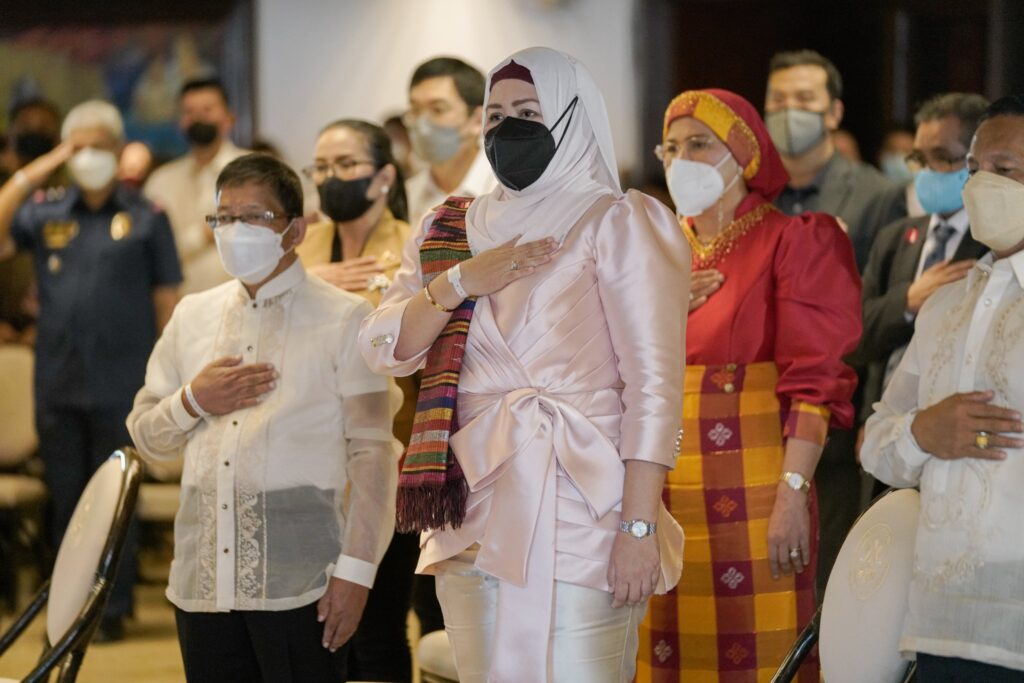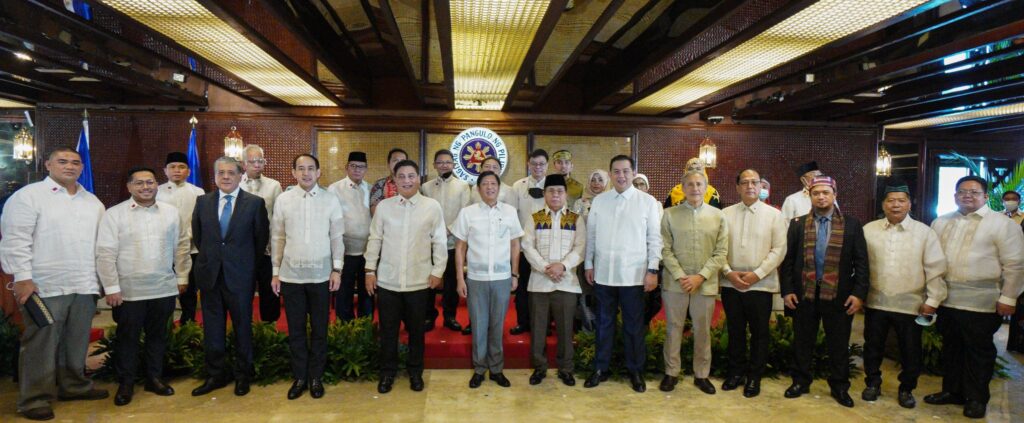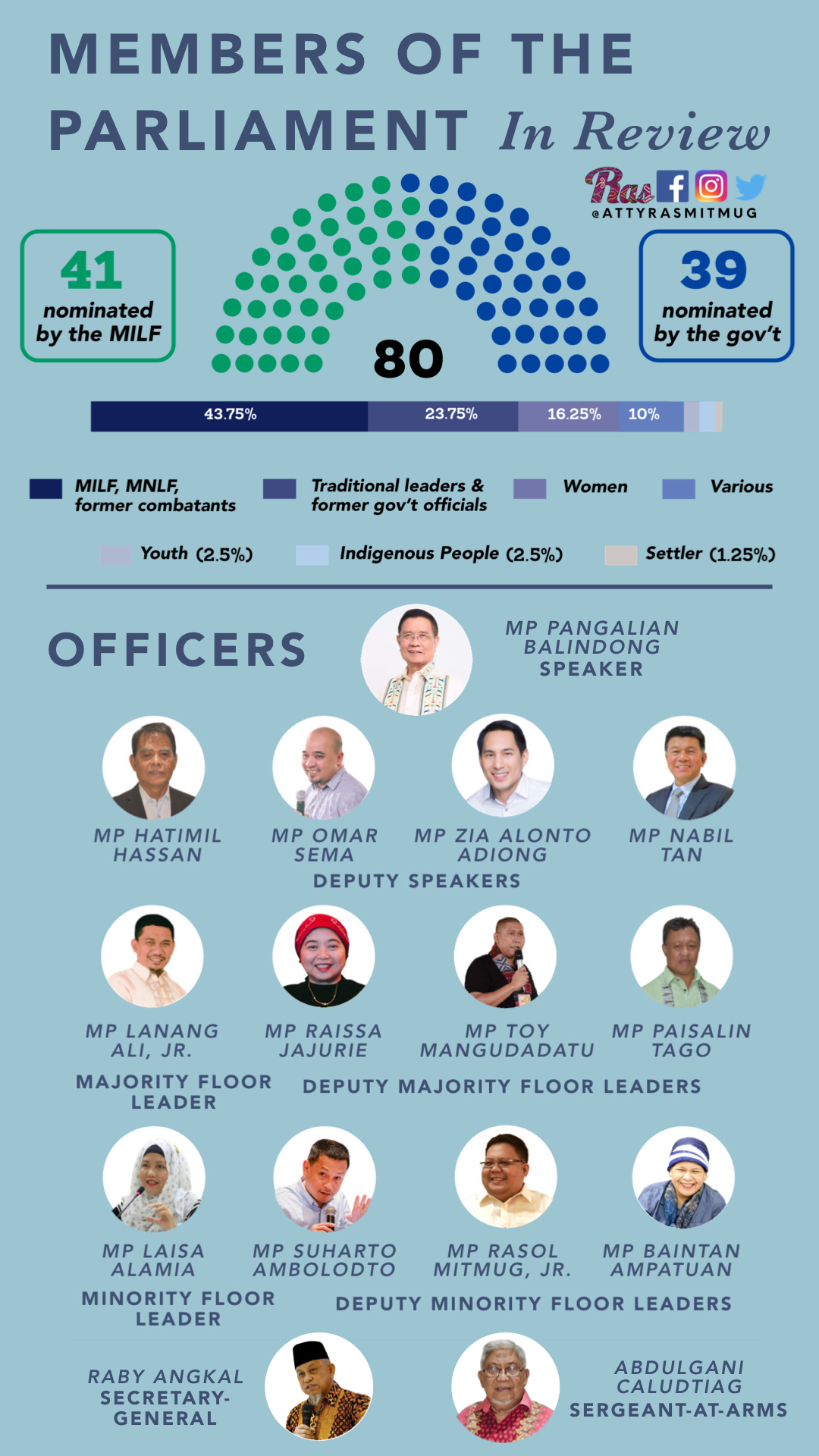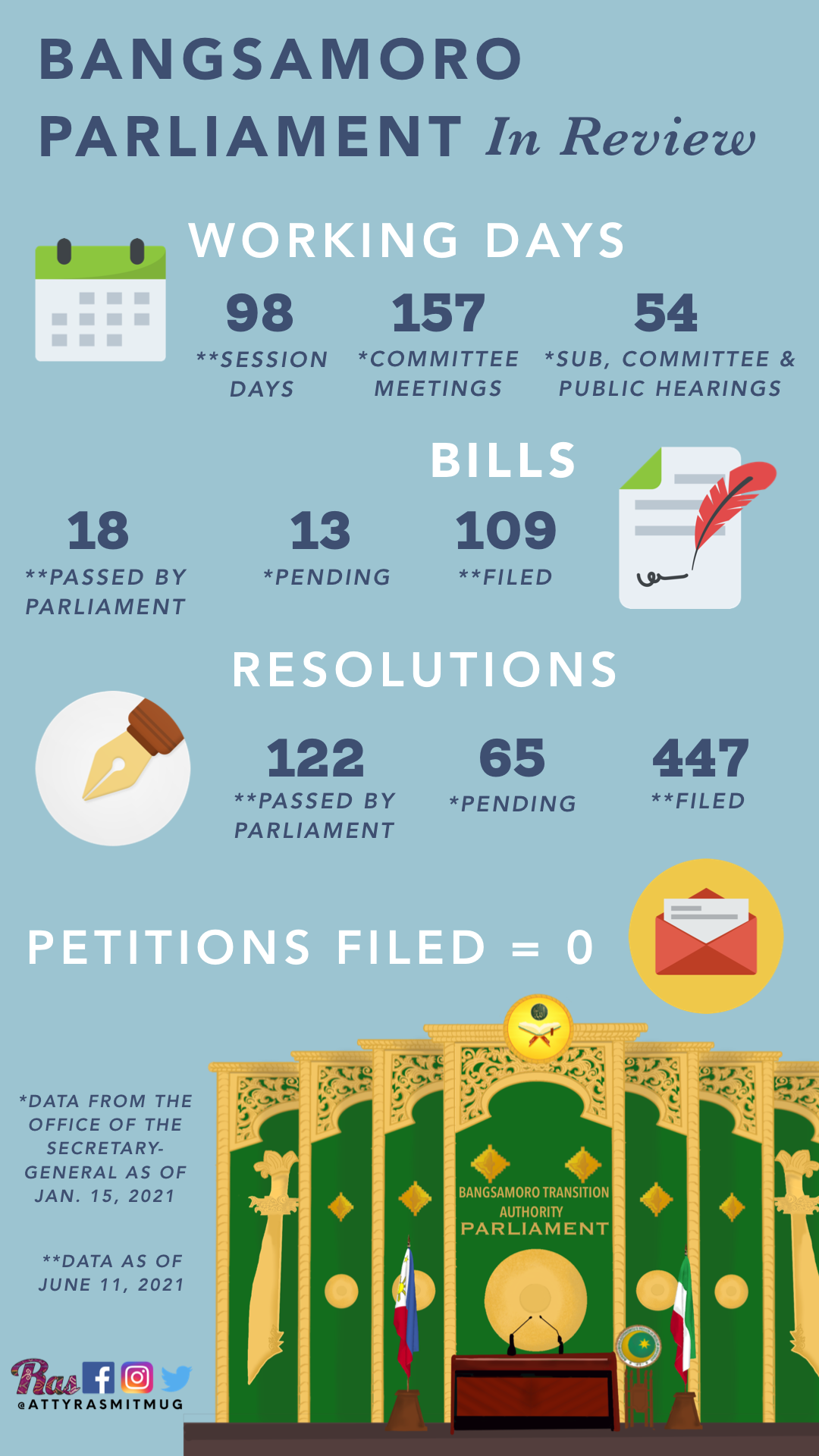COTABATO CITY – The Bangsamoro Transition Authority formally opened its third regular session today, June 15, at the Shariff Kabunsuan Cultural Complex (SKCC).
The opening ceremony is significant, as the Speaker’s Address and the Chief Minister’s State of the Bangsamoro Address is expected to highlight not only the achievements of the Bangsamoro Government, but also its targets and policy agenda.
In his invocation, Grand Mufti Abu Huraira Udasan of the Bangsamoro Darul-Ifta’ (BDI) prayed for continued peace, stability, and security, so that the leaders could overcome the challenges and pursue progress and development for the region. He also prayed for the unity, solidarity, and integrity of the Bangsamoro people.
After the singing of the Philippine national anthem and the Bangsamoro hymn, Wali Sheikh Khalifa Usman Nando delivered his message and led the beating of the agong to formally open the Third Regular Session of the Bangsamoro Parliament. While he praised the achievements of the Bangsamoro Government, he also called attention to other problem areas that the Bangsamoro leadership needs to address. Transcript of his speech below:
Praise be to Allah, Lord of the Worlds, and blessings and peace be upon our Prophet Muhammad and all his family and companions.
His Excellency Rodrigo Roa Duterte President of the Republic of the Philippines.
His Excellency Head of the Bangsamoro Autonomous Government – Ahod “Al haj Murad” Balawag Ebrahim.
H.E Mr. SPEAKER – SPEAKER – Atty. Ali Pangalian Balindong.
Your Excellencies, Honorable Ministers, Members of the Parliament of Bangsamoro.
Honorable scholars (Ulamas).
Datus, leaders of local government in the provinces and municipalities.Dear brothers and sisters, the impact of the Corona pandemic is still before us, as it exhausted our self-government budget, and negatively affected our local and national economy. Also we are still new to this government. But despite the presence of the coronavirus and despite the recency of our time, we have achieved things that others have not achieved. There is no doubt that what we have accomplished within a short period of our assumption of responsibility for reviving our people, whether in terms of providing government aid to the needy in the Moro people, or in terms of enacting legislation, or in terms of implementing projects in the field of health and civil defense, or in terms of attracting our brothers with Arabic education to join the Ministry of Basic Higher and Technical Education (MBHTE) as teachers. These all have not happened in the history of Bangsamoro over decades.
However, these achievements are not sufficient and do not meet the needs of our people. It remains incomplete unless we lay down the groundwork for the justice system through which conflicts and disputes related to rights, whether financial, criminal and other disputes, will be settled. Thus, security and safety will be achieved, through which our people will enjoy comfort and prosperity.
While we are talking about the justice system, there is no doubt that the legal system in Islamic law (Sharia Courts) that is guaranteed by the Bangsamoro Basic Law (BOL) comes to our mind. Let me remind you that the terms and conditions which stated in the BOL regarding to the positions in the courts to be created, whether it is related to the post of a judge or a clerk of court or others. If we look at those rules, we can hardly find qualified staff. However, please do not forget that we have courts under the umbrella of the Moro Islamic Liberation Front, which can be benefited of, as for their long experience in this field.
Means could differ, but the goal is one, which is to achieve justice. So, as long as it is, in my opinion, we can benefit from those who have sufficient experience in the field of arbitration and the court system. We can even ask the Bangsamoro Government (Parliament) to reconsider those conditions agreed upon in the judiciary system and re-studied again if there is a legal space for that. This is if we want to achieve the goal and purpose of establishing the justice system. These are represented in the five goals of Shari’ah, which are: to preserve religion, preserve the soul, preserve the money, preserve the mind, and preserve the honor. Because what concerns us here is the purpose and goal of those ways and means.
On the other hand, despite our achievements, we still need more. For example, in the field of health, we still need health centers to provide various health services to meet the needs of local communities in the countryside, as well as in the field of education. We still need more schools, as there are still many communities suffering from a lack of educational services like schools. Also there are still many of our brothers who are not able to send their children to schools in different areas, especially the Ligawasan. Also if we look at the infrastructure like roads that will connect the villages, then talk and no harm, as we are still behind among the nations in this regard. There are still many of our people who use carts drawn by animals (buffalo or cows) due to the lack of roads.
The unfortunate part of all of these is that human development does not proceed as desired because of these shortcomings, and because of our division and differences. Therefore, I invite you the scholars, the datus and the local and politicians to unite and reunite so that we may rise together and bear the responsibility together, and leave bigotry and intolerance, and put in mind the public interests and prioritize them against our personal interests. We must realize that our progress is in our unity, each of us is in a loophole, we are all responsible before God Almighty, be with us in the revival of our people, for our glory is your glory, and if we fail, you will fail, God forbid. May Allah bless us with his protection and care, Allah is the guardian of success.
Finally, by virtue of the authority vested upon me by law, I now declare this session open.
Speaker Pangalian Balindong then called the session to order and directed Secretary-General Raby Angkal to roll call the Members of Parliament. Out of 80 Members of Parliament, 30 were physically present and 40 others participated through Zoom video conference, thus achieving quorum.
Speaker Balindong reminds Parliament, ‘Focus on work, not critics’
BTA Speaker Atty. Ali Pangalian Balindong delivered his address to the Parliament on the ceremonial opening of the third regular session.
Bangsamoro Wali SHEIKH KHALIFA USMAN NANDO, Chief Minister AL-HAJJ MURAD EBRAHIM, Members of the Cabinet, Officers and Members of the Bangsamoro Parliament, Bangsamoro Mufti ABU HURAIRAH UDASAN, distinguished guests, fellow Bangsamoro, Ladies and Gentlemen.
Assalamu Alaikum Warahmatullahi Wabarakatuh!!
I am full of pride and honor to be again here in this august chamber as the presiding officer of the distinguished men and women of the Bangsamoro Parliament. I have been in the business of legislation for more than two decades, but my sense of fulfillment as a politician and legislator has never been as profound as it is today. To lead an assembly of dedicated parliamentarians who will shape the future of the Bangsamoro is indeed the pinnacle of my career. On top of that, it is quite a rare opportunity for any political career to be led by a visionary, revolutionary leader of a Chief Minister. One cannot help but think that the stars have aligned for the Bangsamoro that crucial elements needed to achieve true empowerment and regional development are all but there.
I am doubly proud as your Speaker because of the things that you have accomplished in your work. Despite the serious challenges, you were able to adapt – turning every misfortune into opportunity, every challenge into goal and every failure into inspiration. You have proven the naysayers wrong. So far, we have enacted three important legislations – the Administrative Code, Civil Service Code and the Education Code – and we are working hard to finish so much more, complete the transition and ensure that the next administration have everything needed to further progress in the region and verily maximize our tenure.
Perhaps, one would ask – how a bunch of professionals who have little or no experience in legislation were able to accomplish these things. The answer is simple – all of you are sworn into the Qur’an to be the instrument of Allah (SWT) to serve all our constituents in the Bangsamoro. And we are bound to do it, crisis or no crisis, in the best and worst of times, with or without the help of anybody.
But we are not yet through. We are not yet out of the woods. The challenges and problems are still there, made even more complicated by constraints in time and resources.
The term-extension of the transitional government is a critical concern for the Bangsamoro people because the institutions that are fundamental before a new regional government is elected in its place, have not been set up. While we have exerted efforts to accomplish our mandate within the timelines prescribed by the Bangsamoro Organic Law, our output has been severely limited by circumstances beyond our control. One, when we started in 2019, the budget we had was designed only for governance as it is intended only for the predecessor of BARMM. Don’t forget that our mandate is not only to ensure transition but also to govern, which brings us to the second and third reasons, our budget was delayed and the pandemic ensued. Still we delivered so much than what were expected given the limitations.
Don’t get me wrong, we are not finding fault. We understand that the national government’s resources have been spread too thin because of the pandemic. And that everyone has, in some way or another, been affected by the health crisis.
What we don’t comprehend is that certain quarters are opposed to the term extension, even if they do not have a complete grasp of our work and did not experience the difficulties that we encountered. Worse, certain Muslim leaders and politicians who claim to be servants of the Bangsamoro are the ones lobbying to the national government, particularly in the Senate and the House of Representatives, against passing the proposed law for term-extension.
For me, the indecisive support of Congress to our plea once again illustrates the insensitivity of some non-Muslim politicians about the plight of the Bangsamoro and the brazenness of some Muslim leaders to be more concerned on strengthening and perpetrating their political power, rather than help the poor Bangsamoro to get up on his feet and prepare for his future. This despite the collaborative leadership as espoused at the outset by the Chief Minister, Murad Ebrahim.
I apologize if I have offended anybody. But this is simply the truth. We have given the reins of government of the autonomous region to politicians since the enactment of Republic Act. No. 6734 in 1989, but we have seen a little improvement on the quality of life of our people since then.
It is therefore necessary that we allow the Bangsamoro leadership, headed by Interim Chief Minister Murad Ebrahim, to finish the mandate and prove their worth to our people, within a reasonable period of time. Let us give these revolutionaries-turned-parliamentarians a complete chance to realize their vision for the Bangsamoro. Perhaps, their perspective, which is forged in the battlefield, is better than most of us, whose idea may have only been fashioned thru the ballot. They have toiled blood, sweat and tears and lost the stamina of their youth for the Bangsamoro. It will not hurt if you will give them a few added amount of time to fulfill their promise to our people, before the strength in their aging bodies fails them. Besides, all of us here are capable individuals. We have time and again proven that. Our house may have been knocked down by the tempest of problems but we have managed to get up and do our work. And we will do our work again, no matter what.
That should be our mindset right now – to continue working with our best efforts for the well-being of our people, regardless of the circumstances. Let us not mind the cynics and haters, and the sour grapes, whose unmistakable self-interest is the sole basis for their existence. Instead, let us better ourselves and let the quality of our work be “the” standard of public service not only to the Filipino nation but to the entire world.
Indeed, you are the jewels of our office. And no amount of hurtful critique can darken your luster. Your sheer determination and sincere desire to help improve the lives of our people have already overcome the initial challenges and birth pains of our fledgling institution. There is no reason why we can falter even if time is not on our side. In Shaa Allah! Wassalamu Alaikom Wa Rahmatullahi Wa Barakatuh.
Chief Minister Ebrahim Enumerates Target Codes in SOBA
In his report, Chief Minister Ahod Ebrahim enumerated that three of the seven priority codes were passed, and that the remaining codes would be filed soon. Aside from listing the Bangsamoro Government’s achievements, he also discussed other legislative agenda of the Parliament.
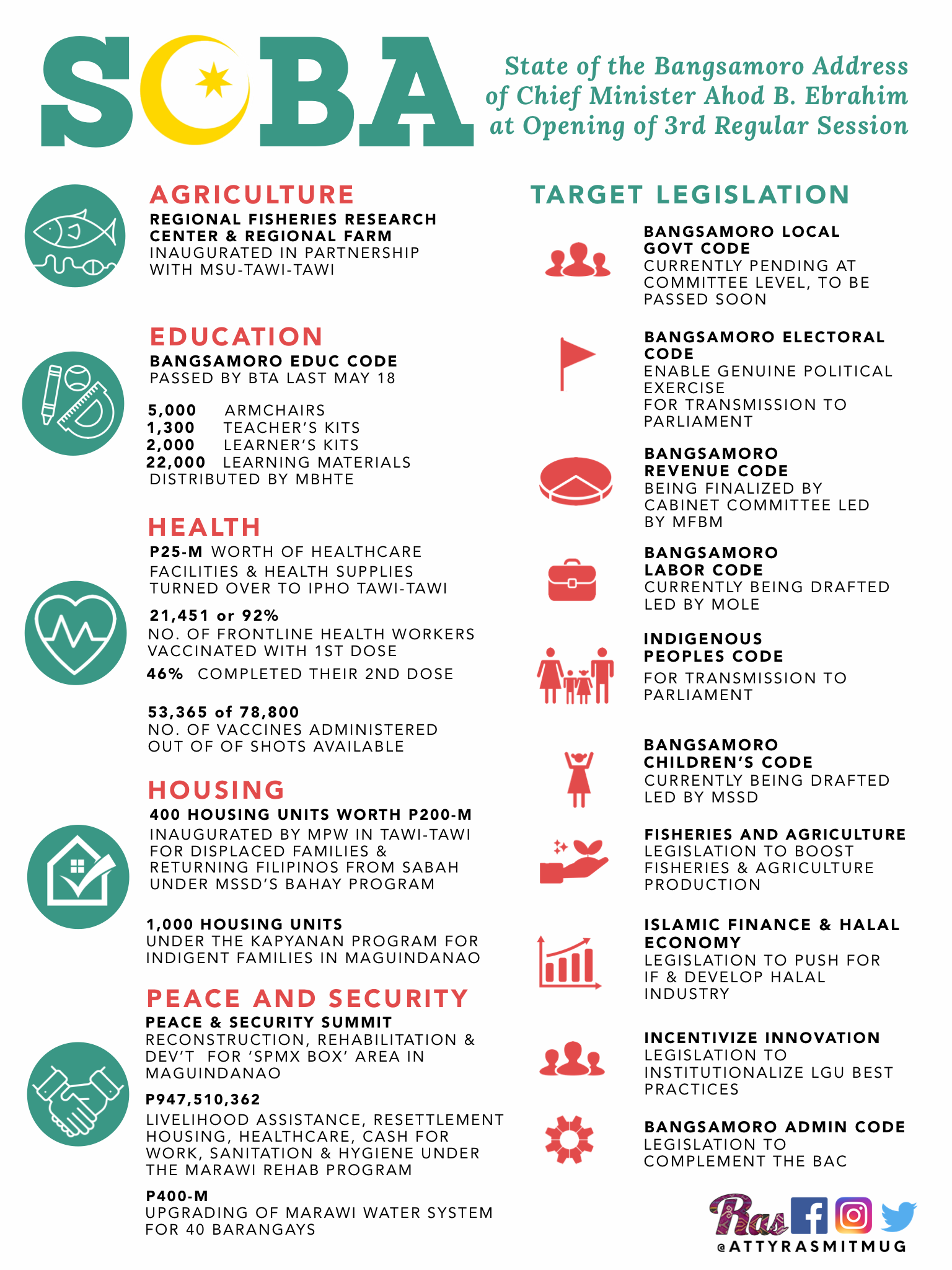
Below is his speech in full.
Subhanaka la ‘ilma lana ‘illa ma ‘allamtana ‘innaka ‘antal-‘Alimul Hakim.
Bismillahir Rahmanir Raheem.
To the Wali of the Bangsamoro: Shiek Khalifa Nando, Parliament Speaker: Atty. Ali Pangalian Balindong, colleagues in the BTA Parliament, members of the Cabinet, friends and partners for peace and development, ladies, and gentlemen, my fellow Bangsamoro:
Assalamu Alaykum Wa Rahmahtullahi Taala Wa Barakatuh.
As we open the third regular session of the Bangsamoro Transition Authority, allow me to take this opportunity to provide recent updates on our collective work as the interim regional government, present issues that face our constituencies, and convey our priorities as we continue to fulfill our mandate during this complex transition period.
I shall begin with a high note by congratulating this august body for passing the Bangsamoro Education Code. This legislation no t only paves the way for a religious and secular balance but adheres to our longstanding culture, traditions, and history. It also provides recognition that is long overdue for our asatidz and their significant role in molding the Bangsamoro students. We thank our very own Education Minister Mohagher Iqbal and the entire Parliament for making this happen. The swift passage of the Bangsamoro Education Code is a clear manifestation that we can overcome great challenges as long as we put our hearts and minds at the task at hand… as long as we work as one.
I hope that the same level of hard work and cooperation will triumph as we pass the remaining priority codes in this legislative year.
The Government of the Day remains devoted to the cause of lasting peace. During the past few weeks, there were initiatives to make sure that we stay true to that commitment.
Several ministries joined forces in conducting the Bangsamoro Peace and Security Summit last month. The activity adopted a whole-of-region approach among key development players and stakeholders for the speedy reconstruction, rehabilitation, and development of conflict-affected communities, particularly in the so-called SPMS box area in Maguindanao. We will make sure that the situation will not scatter and disturb the gains of this peace process.
We are fully aware that there are few people trying to capitalize from this situation to advance their selfish interest. The Bangsamoro has gone through so much pain ang suffering already, and we will continue to do all means necessary not to succumb to the threats imposed by a few. Let us all move forward to the path of peace.
Last May 23, we also commemorated the 4th year since the Marawi Siege happened. To reiterate my message during the remembrance, tens of thousands are still displaced, and layers of challenges are piling on, exacerbated by the ongoing health crisis.
This painful experience cannot allow us, in any given day, to turn our backs to our Maranao brothers and sisters. This is the very reason why we have consistently pushed for the rehabilitation of Marawi as part of our priority agenda and overall development goal.
As of May 2021, the Marawi Rehabilitation Program has already approved a total of Php 947, 510, 362 worth of projects ranging from livelihood assistance, resettlement housing projects, healthcare services, cash for work, water, sanitation, and hygiene projects, and other infrastructure projects.
We have also recently signed a partnership worth 400 million pesos with the provincial government of Lanao Del Sur for the upgrading of the Marawi Water System that will provide adequate water supply for 40 barangays in the city. We sincerely hope that these projects will help Marawi to regain its former glory.
Cognizant of the fact that for us to bring the Bangsamoro to its rightful place, we need the strong partnership and commitment of our local government units to the social transformation we envision. An example of such commitment was exemplified with our PARSUGPATAN with the province of Tawi-Tawi. Earlier this year, the regional government went to the said province to launch flagship programs, inaugurate completed projects, and provide update about our work in the transition period.
We inaugurated the Regional Fisheries Research Center and Regional Farm in partnership with the Mindanao State University – Tawi-Tawi. This collaboration aims to boost the fisheries, seaweeds and other wet market products which will translate to high income of fisherfolks and seaweed farmers. In the long run, we envision Tawi-Tawi to be the center of fishing industry in the region and beyond.
At least 25 Million worth of health care facilities and health supplies which includes one (1) unit of sea ambulance, two (2) units of land ambulances, 1 unit of Disinfection Chamber were turned over to IPHO Tawi-Tawi. These are on top of the existing medical programs and assistance we have been giving to support our health workers.
A total of 5,000 armchairs with around 1,300 teacher’s kits, 2,000 learners’ kits and 22,000 learning materials were likewise turned over by the MBHTE as we further improve the education services.
Various infrastructure projects were also inaugurated such as the two story dormitory to be built by the Ministry of Public Works in MSU Tawi-Tawi, 400 housing units worth 200 million for indigent displaced families and returning Filipinos from SABAH (REFS) under the Bangsamoro Housing Assistance Program (BAHAY Program) of the Ministry of Social Services and Development.
We have also signed an agreement for the construction of 1,000 housing units under the KAPYANAN program. This is extra special as the design of the housing has been tailored fit to the needs and socio-cultural context of the target beneficiaries.
Ladies and gentlemen, these are just some of the major programs and projects of the BARMM for Tawi-Tawi. Similar or equitable projects and programs are also in place for the other provinces in the region. We hope to conductthe same activity in these areas if certain conditions permit such as the COVID19 pandemic that continues to hamper our everyday lives.
Speaking of COVID19, allow me also to share important updates regarding our vaccination program in the region. As of June 13, 2021 19, 831 of the 21, 451 or 92 percent of our A1 priority, the frontline health workers have already received at least 1st dose of vaccine, 46 percent of them have completed their inoculation. The vaccination for the A2, A3, and A4 priority groups is ongoing. We have administered a total of 53, 365 of the 78, 800 shots available. We are assured of the continuous supply of vaccine as we work hard in reaching our target of vaccinating at least 70 percent of our population to attain the herd immunity.
We encourage everyone to get their vaccines as soon as possible. As representatives of various communities from all over the region, fellow Members of the Parliament, I ask that you continue helping us in championing the vaccination program because these are not just doses that can prevent COVID-19, but doses of hope that we may get back the life that we once knew.
Our sincere appreciation to all our health warriors and other frontline workers for their services and sacrifices in this war against COVID19. Maraming maraming Salamat po. Jazakumullahu Khairan. May Allah reward you with goodness.
Ladies and gentlemen, we are a diverse group of people here in the Bangsamoro region united by the common aspirations to address the historical injustices, put an end to the various forms of violence, and bring genuine peace and development through our right to self-determination. This cannot be done overnight but what we can do now is build the structures of governance and pass legislation that will enable our children to live better in a Bangsamoro region we can all be proud of.
I earnestly ask the full cooperation of our colleagues in the parliament as we pass very important legislations starting today. On top of these priorities are of course the remaining codes that we have to finish within the original mandate of the transition period. We shall work hard in passing the Local Governance Code that will further enhance the horizontal and vertical relationship of the LGUs in the Bangsamoro region.
The Electoral Code which is probably one of the most sensitive legislation that this Parliament will enact must be carefully crafted to ensure that we put premium to the betterment of the electorate. We must ensure that it will pave the way for a genuine political exercise that shall serve the core of the regular Bangsamoro government. We shall transmit this to the parliament as soon possible.
The highly technical and equally important Revenue Code is being finalized by the Cabinet Committee led by the Ministry of Finance, Budget, and Management. Rest assured that this too will be transmitted to the Parliament within the year.
The Government of the Day shall submit to this august body a budget that is responsive to the needs of our people and will enable the region to overcome the pressing challenges we continue to face such as the COVID19 Pandemic. This will be the third time in which we will collectively approve a budget based on the block grant we struggled for us as part of the fiscal autonomy envisioned in the Bangsamoro Organic Law and the Comprehensive Agreement on the Bangsamoro. It is important to constantly remind ourselves as we deliberate on this budget that behind the figures are the blood, sweat, and tears of our people. As such, we shall continue to allocate and spend them transparently and rightfully.
I trust the collective wisdom of this parliament as we likewise prioritize laws for certain sectors of our society. We shall work on the legislation that will protect and promote the rights of the Indigenous People pursuant to the intent of the Bangsamoro Organic Law. I tasked the Ministry of Indigenous People’s Affairs to work hard and lead this priority.
The Government of the Day shall submit to this Parliament the Bangsamoro Children’s Code that will further safeguard our children’s rights. After all, what we are doing here in the BTA is for our children and our children’s future. I trust that with the proven stewardship of the Minister of Social Services and Development who is also our assistant majority floor leader, this will be passed as soon as possible.
We shall also prioritize the enactment of a Bangsamoro Labor Code that will protect the workers in the region and ensure that both the employee and employers will not be subjected to abuse and unfair treatment. This is even more important considering that the BARMM is now services oriented according to the Philippine Statistics Authority.
But this is not to say that we will veer away from the other important aspects of our economy. We must continue to support our farmers and fisherfolks in providing them better opportunities and favorable conditions. We shall pass a law that will enable agriculture and fisheries to prosper. I tasked the Ministry of Agriculture, Fisheries, and Agrarian Reform to make this happen.
We must take advantage of the generally better peace and security by attracting more investors in the region. As a matter of fact, in 2019 we were off to a great start when we were able to register 2.3 billion pesos worth of investments, overachieving our targets by 180 percent. It is just unfortunate that covid19 did not spare this momentum, but I am hopeful that by passing legislation that will further boost investment, confidence, and incentives, we can put the region back on track.
Islamic Finance is gaining grounds in the world. Some experts even say that this is the future of finance and banking. We in the Bangsamoro must ensure that we make this potential a reality in our region alongside with the promotion of Halal industry. As such, a comprehensive framework for the Promotion and Development of Islamic Finance and a Halal Economy in the BARMM shall likewise be prioritized in the succeeding months.
Recognizing the performance of our local government units is vital in fostering an environment where innovation, efficiency, and hard work are incentivized. I passionately believe that some of the best practices when it comes to local governance can be found in the Bangsamoro region. It is about time that we make this known and have it institutionalized for the years to come through a legislation towards this end.
It is widely known that the Bangsamoro is rich in energy sources. While we do have a Ministry that has the primary mandate over these in the Bangsamoro, it must be further strengthened through a legislation that will enable the region to benefit from its resources with a sustainable and mutually beneficial framework. If done the right way, these can leapfrog the Bangsamoro to a progressive and developed region.
We must also look into the existing structures in our bureaucracy as founded by the recently passed Bangsamoro Administrative Code. It would be worthwhile to pass legislations not to amend certain provisions of the admin code but legislations that would enhance or complement few of its noble provisions.
Before I end this speech, I would like to share with you that although there are bureaucratic challenges along the way – the call for the extension of the transition period has never been more resounding than now.
The President and the leadership of the Senate and the House of Representatives are giving us the nod that it will happen.
We reiterate, especially to the naysayers, that the extension of the transition period is never about power. It is about ensuring the successful implementation of the Bangsamoro Peace Process.
This is not just the legacy of the MILF or of the Duterte Administration but the legacy of this generation and a gift to the next generations of the Bangsamoro.
Ladies and genetlemen, we cannot afford to fail them.
We must do everything for the sake of the Bangsamoro and submit to the will and plan of Allah. After all, as mentioned in Surat Al-‘Anfāl of the Holy Quran 8:30, Allah is the best planner.
 وَإِذْ يَمْكُرُ بِكَ الَّذِينَ كَفَرُوا لِيُثْبِتُوكَ أَوْ يَقْتُلُوكَ أَوْ يُخْرِجُوكَ ۚ وَيَمْكُرُونَ وَيَمْكُرُ اللَّهُ ۖ وَاللَّهُ خَيْرُ الْمَاكِرِينَ
وَإِذْ يَمْكُرُ بِكَ الَّذِينَ كَفَرُوا لِيُثْبِتُوكَ أَوْ يَقْتُلُوكَ أَوْ يُخْرِجُوكَ ۚ وَيَمْكُرُونَ وَيَمْكُرُ اللَّهُ ۖ وَاللَّهُ خَيْرُ الْمَاكِرِينَ
And [remember, O Muḥammad], when those who disbelieved plotted against you to restrain you or kill you or evict you [from Makkah]. But they plan, and Allāh plans. And Allāh is the best of planners.
With all these being said, I hope that we continue serving our people with passion, sincere intentions, and in remembrance of those who sacrificed for all of us.
The Bangsamoro story shall continue and we are the authors of its most crucial chapters.
Thank you so much and Wassalam.
Majority Floor Leader MP Lanang Ali, Jr. then called for the adjournment of the session. The Bangsamoro Parliament will resume tomorrow on its 59th session.
